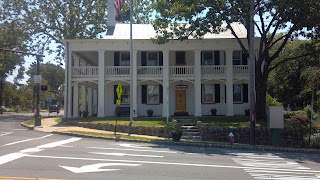Well, it had to happen eventually. After a year and a half of traveling around with Sue, I’m finally contributing a post to Hidden New Jersey. Alert readers may recall that I am an avid student of the Civil War. In addition, Major League Baseball’s 2012 All Star Game will be played tonight. You may be asking “How can he possibly relate New Jersey, baseball and the Civil War?” The answer is quite simple: Abner Doubleday, the man probably best remembered for the fallacious story of his inventing baseball.
In his upstate New York youth, Doubleday did play baseball and some historians contend that he had a hand in codifying some of the rules in those early days of the game. However, he was actually a military man and is buried in Arlington National Cemetery. While walking around the cemetery some years ago, I heard a tour guide point out his grave, mentioning the baseball legend but omitting the reason that Doubleday lies at rest in the nation’s most prestigious military cemetery.
 |
| Phoenix House, Abner Doubleday's first home in Mendham |
Retiring from military service in the 1870’s, Doubleday settled in Mendham and became involved in the Theosophical Society in America, even serving as president of the organization for a time. In those bygone days, the TSA was usually looked upon less than favorably by the religious mainstream despite some prominent members, including Thomas Edison. According the society’s website, Theosophy is intended “to draw together people of goodwill whatsoever their religious opinions, and by their desire to study religious truths and to share the results of their studies with others. Their bond of union is not the profession of a common belief but a common search and aspiration for Truth.”
Doubleday died in Mendham on January 26, 1893 with no word on whether he found his religious Truth. Although some internet sources say he suffered from heart failure, I was fortunate to find an original obituary which indicates his death as being the result of Bright’s disease, a kidney ailment.
No matter what the cause of death, Doubleday certainly lived out his final years in the Garden State, thereby adding to New Jersey’s intimate association with baseball history. From history’s first recorded baseball game (in Hoboken) to the source of the special secret baseball rubbing mud and the home of the world’s only Phil Rizzuto museum, we’ve got strong ties to the national pastime. As for Mendham, bits and pieces of Doubleday still remain. Phoenix House, where he stayed while his own home was being built, still stands on Main Street, but his Hilltop Road house no longer stands. Residents have honored him with a namesake athletic field several blocks away, on Mountain Avenue, and the marker notes his military service along with his reported contribution to baseball.
No comments:
Post a Comment
Note: Only a member of this blog may post a comment.